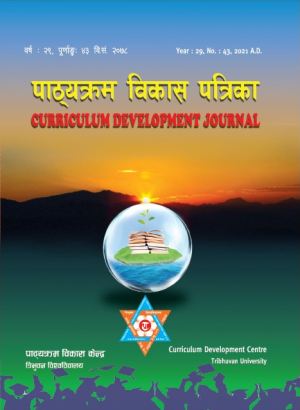Structure and Application of Master’s Level Course of Political Science at Tribhuvan University
DOI:
https://doi.org/10.3126/cdj.v29i43.41065Keywords:
Curriculum, specific vs. general syllabus, Knowledge-based economy, Job market, semesterAbstract
The course of political science at the master’s level is examined in horizontal perspectives with interpretive and constructionism as a philosophic base. The objective of this article is two folds. The first is to review the limitation of the current courses, application, and evaluation manuals and the second is to envisage the application mode and its faculties. The study is based on primary as well as secondary sources of information. The information is collected through a documentary (office record) and telephonic survey. The study follows a mixed method of research. Shifting in semester system from the pre-existing annual system is a reformative step towards quality education. But there are still some challenges in connecting the syllabus and curricular activities to the market. To some extent, the objective of the current course is vague, unspecific, and general. The lack of minimum number of faculties in the periphery and expertise in the Kathmandu valley is a problem for the application of the course. It is needed to train the faculties and adopt more contextual teaching-learning approach as envisioned by the new education policy, 2076. It identifies some contextual issues to make the course more specific, practicable, and applicable. It suggests an alternative learning and evaluation pattern that covers complexities like Covid and the lack of faculties.
Downloads
Downloads
Published
How to Cite
Issue
Section
License
© Curriculum Development Centre, Tribhuvan University

